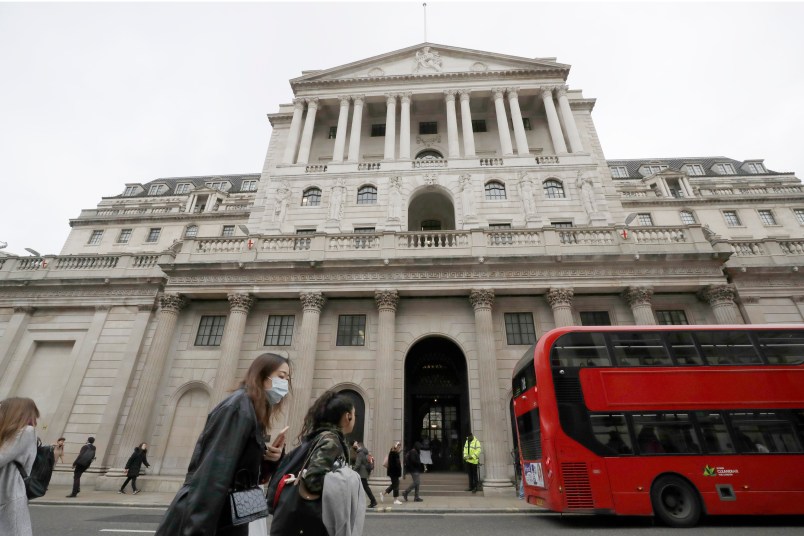LONDON (AP) — The Bank of England warned Thursday that the British economy could suffer its deepest annual contraction in more than three centuries as a result of the coronavirus pandemic, before roaring back next year.
In what it describes as a “plausible” scenario, the bank said the British economy will be 30% smaller at the end of the first half of the year than it was at the start of it, with the second quarter seeing a 25% slump alone following a 3% decline in the first.
Unemployment is projected to more than double to around 9%, but that figure does not include the 6 million workers who have been retained by firms as part of a scheme that sees the government pay up to 80% of salaries. Many of those people furloughed may end up losing their jobs if the economy fails to recover as anticipated or the government starts withdrawing its support too soon.
The bank said the economy should start to recover during the second half of the year as the lockdown restrictions start to be lifted and the extraordinary fiscal and monetary policy measures enacted over the past couple of months begin to have effect.
“We expect the recovery of the economy to happen over time, although much more rapidly than the pullback from the global financial crisis,” said Governor Andrew Bailey.
“We expect that there will be some longer-term damage to the capacity of the economy, but in this scenario we judge these effects to be relatively small.”
The bank expects the economy will contract by 14% this year. According its own statistics, that would be the biggest annual rate of decline since 1706, and markedly more than anything seen in the aftermath of World War I, when the economy was also laid low by the Spanish flu pandemic. The projected fall is also three times greater than the recession of 2008-9 during the global financial crisis.
Over the longer term, the bank thinks the British economy could revive quickly if the pandemic comes under control globally. Under this scenario, it estimates that the economy could grow by by 15% next year, which would be the biggest annual increase since 1704. In fact, the bank expects the economy to be more or less back to where it was by the end of 2021, with the financial sector helping the corporate sector get through the strain — in contrast to the aftermath of the financial crisis, when many banks had collapsed.
How the economy does depends also on how long the lockdown restrictions remain in place. The bank has assumed that both the furlough scheme and social distancing guidelines will be phased out between June and the end of the year. It has meanwhile not factored in a second wave of infections.
Many economists think the bank is being too optimistic.
“While economies can be easily turned off by their governments, it will prove much harder to flick them back on,” said Stefan Koopman of Rabobank International.
The bank’s analysis came after its Monetary Policy Committee decided to keep its main interest rate at the record low of 0.1% and opted against a further expansion of its bond-buying program. Two of the nine policymakers wanted to increase the bank’s stimulus program by another 100 billion pounds ($124 billion).
The policymaking panel had previously announced big cuts in interest rates, an expansion in its stimulus program and a sizeable lending program as it tries to contain the economic damage of the pandemic.
Bailey said the bank stood ready to support the economy further “should we need to,” and most economists think the bank will back another stimulus package in the next few months.
“By sending a strong signal that it plans to ease monetary policy further soon while staying put for now the bank has managed to stay on top of the risks without actually doing anything extra,” said Kallum Pickering, senior economist at Berenberg Bank.







That’s exactly the kind of challenge Dear Leader loves.
He’ll go out of his way to have our continent suffer the worst crash since Columbus stepped ashore…
It’s good to want things.
So they’re all thinking the British economy comes roaring back in 2021, which happens to be (at least at this point) the first year Brexit is fully implemented. If there’s a hedge fund set up on this prediction I’d like to get in on that, I could use a safe investment these days.
I had to look it up.
War and the weather: what caused the huge economic slump of 1706?
The country was very different then. The development of a new merchant class was under way, symbolised by the founding of the Lloyds of London insurance market 20 years earlier and the Bank of England eight years after that. But the country was still primarily agricultural – many of the innovations that drove the Industrial Revolution were still decades away. Wars were expensive and strained economies. So while 1706 saw victory over the French at the battle of Ramillies, it also saw a 15% plunge in national output – an even more severe contraction than the 14% the Bank of England is expecting this year.
The economy was at the mercy of the weather. Three years after the slump of 1706, the country was in trouble again due to the Great Frost of 1709. It helped trigger a 14% drop in activity – a much more severe setback than the pricking of the South Sea Bubble in 1720.
Three centuries ago the success or failure of the harvest had a profound effect on the rate of growth. It was only the movement of population from the countryside to the cities and the development of a modern industrial society that made growth less sensitive to meteorological events.
Well, Mother Nature just delivered a big fat gift to BoJo and the Brexiteers.
The negative economic effects of Brexit will now all be blamed on COVID-19… BoJo will be “rehabilitated.”